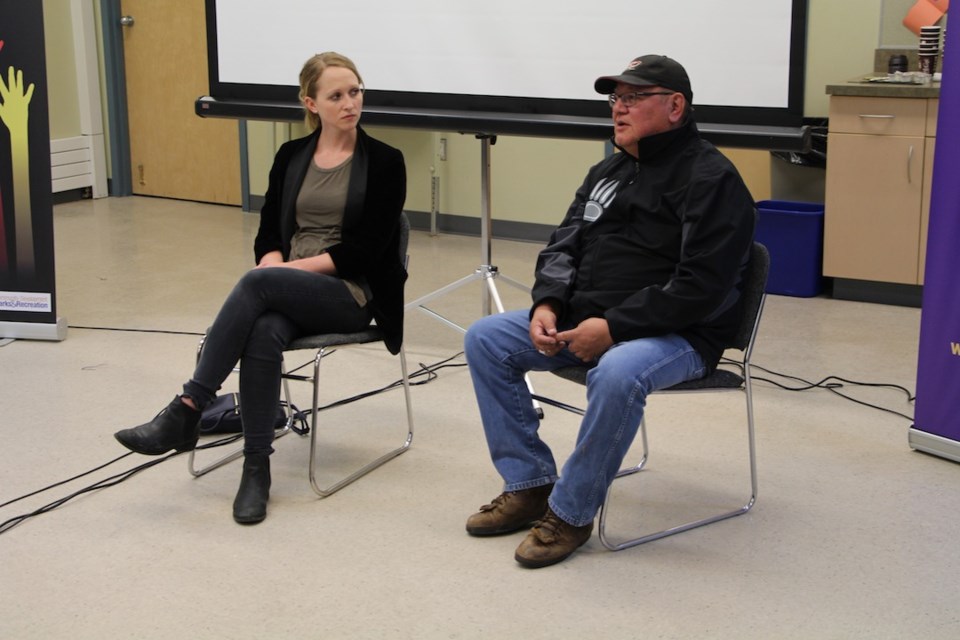The International Day for the Elimination of Racial Discrimination was on March 21, and one of the events in the region to celebrate and help the community deal with racism on our own doorstep was a screening of the film “Cognitive Justice,” produced by the Yorkton Tribal Council, coupled with a panel discussion.
The film discusses what is going on within the Yorkton Tribal Council when it comes to “Indigenizing the classroom,” or incorporating more Indigenous culture into the education system through YTC schools.
Melissa Antony was the producer of the film, and describes herself as an accidental filmmaker, as she did not initially intend to make a film. She asked for a camera to record what was happening during her regular work with the Yorkton Tribal Council.
“So many of the things that were happening every day at work were so inspiring that I felt like the rest of the community needed to hear the voices of First Nations people around Yorkton. They have so much to say. Important messages, empowering messages, sad messages about their history. There is so much racism and ignorance, so I just thought it was important that people would open their minds and learn about some of the things I was learning about.”
The next film from Antony and YTC will be built around Indigenous Chef, a gala coming up in spring. Students are learning how to cook traditional foods, and the film will portray how teaching about food is political and can be used as a tool for teaching subjects far beyond the kitchen. Antony says it was inspired by questions following the first film, asking about how to indigenize the classroom.
“It’s teaching [us] to think about education as this out of the box idea.”
Panel member Richard Fiddler was impressed by the film.
“I think the message is slowly getting out there through this type of media and this type of format.”
When it comes to Indigenizing the classroom, Fiddler wants to make it clear that it’s not about taking anything out of the classroom, but instead adding history and culture to give students an better idea of their history and place in the world.
“It sounds like we’re running away from numbers and vowels, reading and writing... No, we need that, we still need “the cunning of the white man.” We still need the skills and the research strategies. We embrace the technology and embrace the computer... But Indigenizing the curriculum means more. We have a story to tell also, that’s important to the development of Canada.
“Someone is forgetting that we also contributed to the wars. We fought for freedom and came back to be treated like children. We went overseas to fight for freedom and we came back to not being able to vote until 1960, or not being able to go into the local establishments to have a few beers until years later. Not having the same privileges as an ordinary Canadian citizen. That’s got to get out there more, that we did contribute, we are an important part of Canada’s development as a country, we do believe in Canada, we do want to be a part of Canada.”
The important thing for Fiddler is that people understand where First Nations people are coming from. Fiddler views Canada as a banquet table, with food representing the abundant natural resources that the country has available to it, like potash, oil and forestry products.
“Every nation is represented at that table, except the First Nation, that child is locked in a closet in the dark, and left. They can’t eat at the table... That child is only brought out to fight in WWI, WWII, the Korean conflict. Victory achieved, back in that closet, go back to your reserve, go back to your Indian agent, go back to your boarding school, go back to your little piece of land that we granted you.”
That kind of oppression is what Fiddler sees as leading to the problems currently faced by First Nations communities, which is being expressed through lateral violence.
“Lateral violence comes out in different forms. In gangs, in drugs, in prostitution, in missing and murdered aboriginal women. It comes out in all kinds of problems. Canada then asks, what’s wrong with these people? Haven’t they benefitted from our generosity? Now, there’s about 150,000 First Nations in Saskatchewan, there are about 1,000,000 people, we have to be accepted and embraced, we have to be part of the success.”
The key is a fresh start, and new understanding, Fiddler believes.
“Forgiveness is not necessarily going to happen tomorrow morning, but we do have to have a new talk, a new form of reconciliation going forward from here on. A reset button is needed.
“The Stanley-Boushie case highlighted there is a problem, in the court system, in the health system, in the education system. Whatever systems we have in the province. We don’t have 100 per cent access to those systems. But at the same time we as a people can’t go through another 100 years of blaming the white man. We also need to embrace, not so much only the ceremonies, the rites and things like that. We have to embrace the values that kept us alive for thousands of years. Those have to be amplified, the truth, the honesty, the humility, the courage, mutual support, reciprocity, helping each other. That has to come out again, we have to remember who we are, that was almost taken away from us. I’m not talking buckskin, beads and feathers here, I’m talking heart, honesty, hard work, suffering.”



